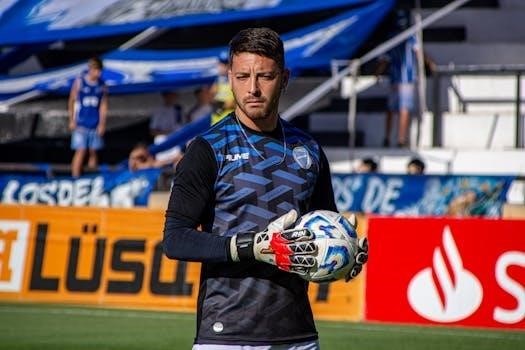Meaning and Origin of “Practice Makes Perfect”
The expression “Practice Makes Perfect” conveys that consistent repetition improves skills․ Achieving mastery requires time and dedicated effort․ It emphasizes that repeated actions become ingrained‚ enhancing expertise․ This saying encourages persistent practice‚ leading to eventual perfection in any endeavor‚ from music to sports․

The True Meaning of the Phrase
The phrase “Practice Makes Perfect” signifies that consistent effort and repetition are essential for skill development․ It suggests that through repeated engagement with a specific activity or task‚ one can achieve mastery and proficiency․ The core meaning centers on the idea that continuous practice hardwires actions into the mind‚ refining abilities over time․
While often interpreted literally‚ “Practice Makes Perfect” doesn’t guarantee absolute flawlessness․ Instead‚ it highlights the importance of dedicated effort in improving competence․ The phrase underscores that persistent training leads to increased accuracy‚ precision‚ and overall skill enhancement․ It is a reminder that progress results from sustained commitment․
The phrase encourages individuals to embrace repetition as a pathway to growth․ It promotes the understanding that consistent engagement with a skill‚ even when challenging‚ ultimately leads to improvement․ The true meaning of “Practice Makes Perfect” lies in its emphasis on the value of perseverance and dedication in the pursuit of expertise‚ understanding that perfection is an ideal to strive for through continuous learning and refinement․
Does Practice Really Make Perfect?
The age-old adage “Practice Makes Perfect” is often questioned in its literal sense․ While practice undeniably leads to improvement‚ the notion of achieving absolute perfection is debatable․ Cognitive science suggests that practice alone doesn’t guarantee flawlessness․ Instead‚ sustained and focused practice is key․
Repeatedly performing an action can solidify habits‚ but if those habits contain errors‚ practice simply reinforces those mistakes․ Perfect practice‚ on the other hand‚ emphasizes error correction and mindful repetition․ This approach aims to refine skills by eliminating flaws and solidifying correct techniques․ Therefore‚ it is a more accurate path to mastery․
The effectiveness of practice also depends on individual factors like learning style‚ innate talent‚ and the quality of instruction․ While practice is crucial‚ it’s not a universal guarantee of perfection․ Instead‚ it serves as a foundation upon which individuals can build expertise through dedicated effort‚ focused attention‚ and continuous refinement of their skills‚ moving ever closer to their desired level of proficiency․

The Importance of Perfect Practice
While the saying goes “practice makes perfect‚” the truth lies in “perfect practice makes perfect․” This emphasizes the quality of practice over mere repetition․ Engaging in mindless repetition can reinforce mistakes‚ hindering improvement․ Perfect practice‚ however‚ focuses on mindful execution and error correction․
Perfect practice involves actively identifying and addressing weaknesses․ It requires a deep understanding of the skill being developed and a commitment to performing each repetition with precision․ This may involve seeking guidance from experts‚ analyzing performance‚ and making adjustments to technique․
The goal of perfect practice is not just to repeat an action‚ but to refine it continually․ This means paying attention to detail‚ focusing on proper form‚ and striving for consistency․ By prioritizing quality over quantity‚ individuals can accelerate their progress and achieve a higher level of mastery․ Perfect practice also cultivates a growth mindset‚ fostering a willingness to learn‚ adapt‚ and persevere in the face of challenges‚ ultimately leading to more effective and fulfilling skill development․
Practice Makes Permanent
A crucial aspect often overlooked is that “practice makes permanent‚” not necessarily perfect․ This highlights the importance of correct technique from the outset․ Repetitive actions‚ whether performed correctly or incorrectly‚ become ingrained habits․ Therefore‚ flawed practice solidifies mistakes‚ making them harder to correct later․
If you consistently practice a skill with incorrect form‚ your body and mind will adapt to that incorrect form․ This can lead to the development of bad habits that are difficult to break․ Correcting these ingrained errors requires significantly more effort than learning the skill correctly from the beginning․
Therefore‚ seeking proper instruction and guidance is crucial․ A knowledgeable teacher can identify and correct flaws early on‚ ensuring that your practice reinforces correct technique․ Emphasizing accuracy and precision in every repetition is essential․ This approach ensures that practice leads to the permanent establishment of correct and effective skills‚ rather than the entrenchment of errors that hinder progress and potentially cause frustration․
Practice Makes Progress
While “practice makes perfect” is a common adage‚ a more realistic perspective is that “practice makes progress․” Perfection is often an unattainable ideal‚ whereas progress acknowledges the continuous journey of improvement․ This reframes the mindset from striving for an impossible standard to celebrating incremental advancements․
Focusing on progress allows for a more positive and sustainable approach to learning․ It encourages individuals to recognize and appreciate the small victories along the way‚ fostering motivation and perseverance․ Each practice session‚ regardless of perceived imperfections‚ contributes to overall growth and development․ Embracing this perspective reduces the pressure associated with perfectionism‚ creating a more enjoyable and effective learning experience․
Furthermore‚ “practice makes progress” highlights the importance of consistent effort․ Regular engagement with a skill‚ even in small increments‚ yields tangible results over time․ This emphasizes the value of sustained dedication and the gradual accumulation of knowledge and expertise․ By acknowledging and celebrating progress‚ individuals are more likely to maintain their commitment and ultimately achieve their goals‚ even if absolute perfection remains elusive․
Practice in Different Languages
The adage “Practice Makes Perfect” resonates universally‚ and its essence is captured in various languages around the world․ Each translation offers a unique cultural perspective on the importance of consistent effort and dedication in achieving mastery․
In Spanish‚ a common equivalent is “La práctica hace al maestro‚” which translates to “Practice makes the master․” This emphasizes the role of practice in elevating someone to a position of expertise․ Similarly‚ in French‚ one might say “C’est en forgeant qu’on devient forgeron‚” meaning “It is by forging that one becomes a blacksmith;” This highlights the transformative power of repeated action in developing a skill․
German offers “Übung macht den Meister‚” directly translating to “Practice makes the master․” This mirrors the English version in its straightforward assertion of practice’s importance․ Russian expresses the sentiment with “Повторение – мать учения” (Povtoreniye – mat’ ucheniya)‚ meaning “Repetition is the mother of learning‚” highlighting the crucial role of repetition in the learning process․
These diverse translations demonstrate the global recognition of the principle that consistent practice is fundamental to achieving excellence in any field․ The specific wording may vary‚ but the underlying message remains the same⁚ dedication to practice is the key to improvement․

Examples of Using “Practice Makes Perfect” in Sentences
The phrase “Practice Makes Perfect” is a versatile idiom‚ easily incorporated into various contexts to encourage perseverance and highlight the value of consistent effort․ Its application spans across diverse fields‚ from academics to sports and creative endeavors․
Consider a student struggling with mathematics⁚ “Don’t worry if you don’t understand it right away; practice makes perfect․ Keep working through the problems‚ and you’ll eventually grasp the concepts․” This encourages them to persist despite initial difficulties․
For a musician learning a new instrument⁚ “The piece seems challenging now‚ but practice makes perfect․ Dedicate time each day‚ and you’ll see significant improvement․” Here‚ the phrase motivates consistent dedication․
In a sporting context⁚ “Your free throws aren’t consistent yet‚ but practice makes perfect․ Keep shooting those hoops every day‚ and you’ll become more accurate․” This emphasizes the importance of repetition in skill development․
When learning a new language⁚ “Speaking fluently feels daunting‚ but practice makes perfect․ Don’t be afraid to make mistakes; just keep practicing‚ and you’ll become more confident․” This encourages embracing imperfection as part of the learning process․
These examples illustrate the phrase’s broad applicability and its effectiveness in conveying the message that consistent effort leads to improvement and mastery․

When Practice Doesn’t Make Perfect
While “Practice Makes Perfect” is a widely accepted adage‚ it’s crucial to acknowledge scenarios where mere repetition falls short of achieving the desired outcome․ This occurs when practice reinforces incorrect techniques or lacks focused attention‚ leading to stagnation or even regression․
If a guitarist practices a scale incorrectly for hours‚ they’re not moving closer to perfection; they are solidifying bad habits․ Similarly‚ a basketball player shooting free throws with flawed form will only become more proficient at shooting incorrectly․
Mindless repetition without conscious effort or expert guidance rarely yields improvement․ It is very important to ensure that you are practicing the right way․
Furthermore‚ practice alone cannot compensate for a lack of natural aptitude or physical limitations․ While dedication can enhance skills‚ inherent predispositions often dictate the extent of achievable mastery․
The phrase fails when neglecting the importance of seeking feedback and adapting strategies․ A tennis player who continues using an ineffective serve‚ despite consistent losses‚ won’t improve without analyzing their technique and making necessary adjustments․
Ultimately‚ effective practice requires a combination of repetition‚ focused attention‚ expert guidance‚ and a willingness to adapt and learn․
Alternatives to “Practice Makes Perfect”
While “Practice Makes Perfect” is a popular mantra‚ several alternative phrases offer nuanced perspectives on skill development․ “Practice Makes Progress” highlights incremental improvement rather than unattainable perfection․ It acknowledges that continuous effort leads to advancement‚ fostering a growth mindset․
“Perfect Practice Makes Perfect” emphasizes the importance of quality over quantity․ It suggests that practicing correctly and mindfully is more effective than simply repeating mistakes․ This phrase encourages focused attention and deliberate effort․
“Repetition is the Mother of Skill” focuses on the role of repeated action in building competence․ It underscores the power of consistent practice in developing expertise‚ without necessarily implying flawless execution․
“Use it or Lose it” highlights the need for continued engagement to maintain proficiency․ It suggests that skills erode without regular practice‚ emphasizing the importance of sustained effort․
“The More You Do‚ the Better You Get” is a straightforward reminder that consistent effort leads to improvement․ It is a simple and encouraging way to motivate practice․
These alternatives offer valuable insights into the dynamics of skill acquisition‚ emphasizing progress‚ quality‚ and the importance of consistent effort․
The Role of Sustained Practice
Sustained practice is the cornerstone of skill mastery and lasting improvement․ It goes beyond occasional efforts‚ emphasizing consistent and ongoing engagement with a particular activity․ This regular commitment allows for deeper learning‚ refinement of technique‚ and the development of ingrained habits․
Unlike sporadic practice‚ sustained practice fosters continuous progress․ It allows individuals to identify and address weaknesses‚ build upon strengths‚ and gradually elevate their performance․ This consistent effort transforms initial struggles into effortless execution‚ creating a solid foundation for expertise․
The benefits of sustained practice extend beyond mere skill acquisition․ It cultivates discipline‚ perseverance‚ and a growth mindset․ Regular engagement challenges individuals to overcome obstacles‚ learn from mistakes‚ and continuously push their boundaries․
Moreover‚ sustained practice promotes long-term retention and adaptability․ Skills developed through consistent effort are more likely to endure over time‚ and individuals become better equipped to adjust to new challenges and evolving circumstances․
In essence‚ sustained practice is the key to unlocking true potential and achieving lasting success․ It transforms innate talent into refined skill‚ fostering expertise and resilience․